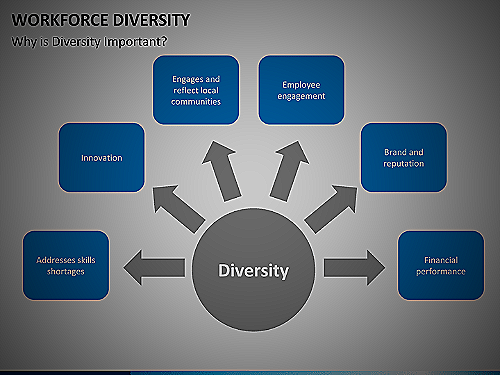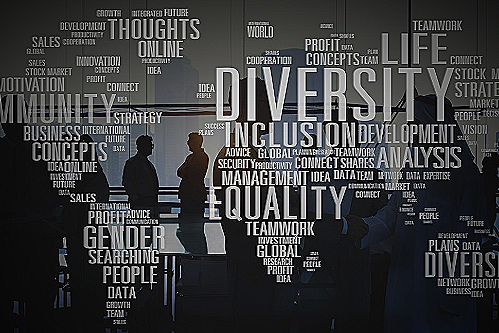Why is Diversity Important for Employee Engagement? [2023]
Why Diversity Matters in the Workplace
Diversity is more than just a buzzword. Embracing diversity in the workplace is essential for creating a positive, inclusive, and productive environment for employees.
An inclusive workplace can attract a diverse range of talent, and a workforce made up of people with different backgrounds, experiences, and perspectives can lead to more creativity, innovation, and better problem-solving.

Moreover, embracing diversity in the workplace can improve employee engagement. When employees feel valued, respected, and included, they are more likely to be engaged in their work and stay with the organization.
Organizations that invest in diversity and inclusion are more likely to attract and retain top talent, resulting in a more skilled, loyal, and motivated workforce.
Benefits of Diversity in Employee Engagement
Studies have shown that diverse workplaces have higher levels of employee engagement. When employees feel that their workplace is inclusive, they are more likely to feel engaged in their work and committed to the organization’s mission and goals.
Check out this Youtube video: “The Importance of Diversity In The Workplace-YouTube” to learn why diversity is important in the workplace and how it can positively impact employee engagement, finance, and more.
Diversity’s Significance in the Corporate World.
Why is diversity important in the workplace? Research has shown that diverse companies outperform their competitors and have higher profitability rates.
A study by McKinsey & Company found that organizations in the top quartile for racial and ethnic diversity are 35% more likely to have above-average financial returns compared to their industry peers.

Not only is diversity important for financial success, it also leads to enhanced innovation and better decision-making. Diverse teams bring different perspectives and experiences to the table, which can lead to more creative and effective solutions.
Furthermore, promoting diversity in leadership can lead to better talent development and retention. By providing equal opportunities for all employees, companies can foster a culture of inclusivity and promote a sense of belonging for all.
The Impact of Diversity on Employee Engagement
Why is diversity important for employee engagement? The positive relationship between diversity and engagement.
Research has shown that a diverse workforce can lead to better problem-solving, greater creativity, and innovation. When employees come from different backgrounds, cultures and experiences, they bring a range of perspectives and ideas that can contribute to a company’s success.
Furthermore, when individuals feel that they are valued and respected for their differences, they are more likely to feel engaged and committed to their work.
The importance of inclusion: Building an inclusive culture is crucial for engagement among diverse employees. Employees who feel included in the workplace tend to feel more positive about their work and are more likely to stay with their employer long-term.
In contrast, a work environment that is unwelcoming or hostile to certain groups can result in high turnover and low engagement.

The Challenges of Achieving Diversity and Inclusion
Diversity and inclusion are essential components of any organization, but there are significant challenges to building and maintaining a diverse workforce and an inclusive workplace. These obstacles can include:
The Obstacles to Diversity
One of the most significant barriers to building a diverse workforce is a lack of diverse candidates for open positions. Hiring processes may unintentionally exclude qualified candidates from certain demographic groups due to bias or the use of rigid requirements for particular qualifications.
Additionally, even when diverse candidates are available, organizations may struggle to retain them due to a lack of opportunities for professional growth, discrimination and microaggressions in the workplace, and a lack of inclusion.
The Role of Bias
Unconscious bias is another significant obstacle to achieving diversity and inclusion. Bias can impact hiring decisions, performance evaluations, and team dynamics, leading to underrepresented groups being excluded from certain roles or processes.
It can be challenging to recognize and mitigate these biases, especially when they are unconscious.
Breaking Through Barriers to Diversity

To achieve diversity and inclusion in the workplace, it is essential to take proactive steps to address these challenges. Organizations should implement bias-awareness training, develop programs to recruit diverse candidates, and provide opportunities for professional growth for all employees.
Additionally, creating a culture of inclusion requires ongoing attention and intentional efforts, such as actively seeking out and valuing diverse perspectives and experiences and addressing any incidents of discrimination or exclusion.
In conclusion, achieving diversity and inclusion is critical to organizational success. While there are challenges to building diverse organizations, proactively addressing them can lead to significant benefits, including better decision-making, increased innovation, and improved profitability.
The Legal Imperative for Diversity
Diversity and inclusion in the workplace are not just moral or ethical imperatives – they are legal requirements. The Equal Employment Opportunity Commission (EEOC) enforces certain federal laws that prohibit employment discrimination based on race, color, religion, sex, national origin, age, disability, or genetic information.
Diversity and inclusion policies in the workplace help ensure that employers do not violate these laws.
Non-compliance with these laws poses significant risks to organizations. Companies that fail to meet these legal requirements may face lawsuits, penalties, and other consequences.
In addition to legal risks, organizations may also face negative publicity and damage to their reputation. Therefore, achieving diversity and inclusion is not just good for the employees, it is also good business.

Overcoming the Challenges: Strategies for Building Diversity and Inclusion
The importance of leadership commitment: Diversity and inclusion initiatives should be driven by top-level leaders in an organization. When leaders demonstrate their commitment to creating a diverse and inclusive workplace, it sends a message that every employee is valued and important regardless of their background.
This reinforces the idea throughout the organization, allowing employees to feel included and motivated to do their best work.
The value of data: To measure the progress of diversity and inclusion initiatives, it’s important to collect data that tracks an organization’s diversity, including areas for improvement. This data can then be used to develop strategies and create an inclusive workplace culture.
By having a comprehensive understanding of the makeup of an organization’s workforce, companies can take action to enhance representation in underrepresented groups.
The power of training: Diversity and inclusion training programs can help teams operate more effectively and inclusively, creating an environment where everyone feels valued and respected. The training can help employees to understand unconscious biases, increase their empathy and awareness, and help to develop better communication skills.
This can provide teams with the skills to tackle complex problems, create an inclusive work environment with positive outcomes that give a sense of belonging to all employees.

Why is Diversity Important?
Diversity in the workplace offers numerous benefits to organizations. It provides an opportunity to tap into a wider talent pool, increases creativity and innovation, and improves decision-making.
Employees from diverse backgrounds bring different perspectives and experiences to the table which helps companies to better understand their customers and anticipate their needs.
The Business Case for Diversity
Studies have shown that diversity is linked to better financial performance. Companies with higher levels of diversity on their leadership teams saw a 19% increase in innovation revenue compared to companies with less diverse leadership teams.
Having a diverse workforce can also help companies to better understand their customers and identify new market opportunities.
Diversity and Inclusion Challenges
Diversity brings with it some challenges including communication issues, cultural misunderstandings, slower decision-making, inequitable inclusion, and discrimination. Organizations need to focus on building an inclusive culture where everyone feels involved, valued, respected, and treated fairly.
Empowering all employees, regardless of background, can help to foster a sense of belonging and increase engagement.

![Why is Diversity Important for Employee Engagement? [2023]](https://leaveadvice.com/wp-content/uploads/2023/05/Why-is-Diversity-Important-for-Employee-Engagement-2023.webp)